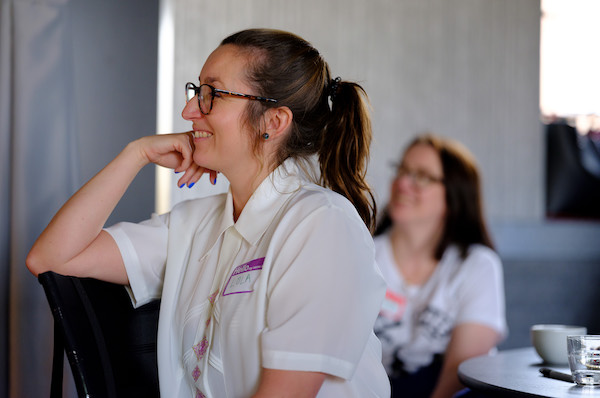Humans of dxw: from publishing to product

I was keen to help shape how we think about product within dxw
From my mid-teens, I thought I had a very clear idea of what I wanted to do – be a publishing editor. But the reality didn’t quite match my expectations of the ‘dream job’, and I soon found myself being drawn to digital projects.
I was quite bookish at school and literature felt like the natural fit when it came to applying for university. I ended up at York taking English with a smattering of French and German literature. At the time I chose it just because I love to think and write about stories, but I’ve come to really value the analytical and communication skills that come out of a humanities degree. It was also my first time in the North of England and the start of a love for the Yorkshire countryside which persists to this day.
My dissertation focused on the way we interpret interactive book apps, which were very much in vogue at the time, compared to traditional reading patterns. (The multimedia iPad version of Shakespeare’s Sonnets holds up surprisingly well for something that hasn’t been developed in over a decade.) In hindsight this might have been an early indication that I was more interested in the potential of digital spaces!
I gravitated towards publishing because I loved books, of course, but more specifically because I was interested in the way the industry balanced creative outputs with practical constraints like budgets and reading trends.
I was extremely lucky that my time at university sheltered me from the worst years of the financial crash of 2008, and by the time I graduated the job market was beginning to recover. I took a scatter-gun approach to applications in the hope that any job in publishing would help me get a foot in the door.
After a few fretful months, I managed to get a temporary contract as an assistant on a web project for an academic publishing house. The job was mostly co-ordinating stakeholder meetings to gather requirements and getting feedback on designs. But it was my first experience of a digital project and introduced me to a whole new language and way of thinking.
It also helped me get a more practical understanding of what I wanted to do in publishing, and I eventually moved into a more traditional editorial role. This was my first – and as of yet only – job that wasn’t focused on digital projects, and there is something nice about looking over the little shelf of books that I helped make and handling that very tangible result of a project. The very best feeling was seeing authors absolutely thrilled to see their work out in the world. I also really enjoyed coming up with ideas for covers and blurbs that would help readers get a feel for the book.
After a few years, I started to feel a shift, and I couldn’t stop thinking about what dissatisfied me about the industry – particularly around the growing emphasis on quantity over quality and the limited progression opportunities. The charm had started to fade, but I spent some time in a more digitally-focused role working with archives to create online collections of their historical materials. The stories I gleaned from official records, personal letters, old photos and oral history recordings still resonate with me. It was an interesting job in a lot of ways – but my frustrations remained and ultimately I decided it was time for me to leave publishing.
It was pretty nerve-wracking, not to mention demoralising, to think about moving away from the ‘dream job’ I’d focused on for so long. I knew I wanted to work somewhere with a clearer focus on public good, but the next step was unclear and I felt a little overwhelmed by options. I’m not very comfortable with uncertainties, so I did what I always do to focus my mind – I made a list! I wrote down everything I thought I could do well, what I wanted to develop, and what I valued in a workplace.
My list helped me rule out a lot of job ads while also keeping an open mind in terms of job title and sector. Soon one caught my eye – a Research Manager position at a charity that provided technical services to universities and colleges. It was a maternity cover that would have me working across their product line – the second time a temporary contract has helped me figure out what I want to do.
From there, I held other positions at the organisation, managing a couple of products used by local authorities, NHS Trusts and international academics. I learnt a lot from some really fantastic teammates – some of whom had helped establish the use of internet technologies in UK research and education. I’m particularly grateful for a colleague who recognised my interest in product management and spent time mentoring me.
When I applied for this role at dxw, I had a vague sense that I wanted to move on to the next challenge within Product, but was pretty flexible to what this might look like. I’ll admit what intrigued me at first was the unbiased recruitment model, which felt like a really positive sign of company values in practice. But I became more and more interested as I spoke to people and looked into dxw’s past projects. I was particularly keen for the chance to be part of the new Product and Performance team and help shape how we think about product within dxw.
I know how happy I am to have joined the company. Everyone has been incredibly welcoming and it feels like I have a real role to play here. I can’t wait to see how things develop next!